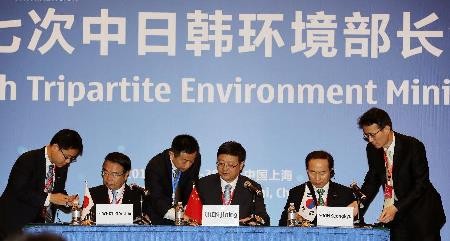China, South Korea and Japan are set to form two new working groups and draft an action plan that would address and tackle air pollution in northeast Asia, the China Daily reported.
The report was based on a joint statement by the 17th Tripartite Environment Ministers Meeting in Shanghai on April 30, Thursday.
The new working groups are expected to encourage further regional cooperation on air quality monitoring, technology and research.
According to the statement, the first working group will focus on scientific research on the control and prevention of air pollution this year, while the second group will gather scientific researchers and other personnel to promote the technology and policy on air quality monitoring and forecasting.
During the meeting, the ministers from the three countries called attention to the urgent need to create solution to air pollution caused by PM2.5, the airborne particles that measure 2.5 microns in diameter.
The ministers have announced a joint plan of action for environmental cooperation that will be implemented from 2015 to 2019. According to the plan, the group will focus on nine priority areas that include air quality improvement, water and marine environment conservation and green economy initiatives.
Yoon Seong-kyu, the South Korean environment minister, said that they will share with China information on dust and sandstorms through special channels, while South Korea will provide more accurate forecasts on sandstorms.
In a statement released to the media, Chen Jining, China's minister of environmental protection, said that China has taken serious steps to address air pollution and improve the country's air quality.
Chen added that its heavy industrial structure, huge coal consumption and the economic gap between its eastern and western regions are challenges that China faces as a developing nation, which makes air pollution control a long-term mission.
"But we are confident of solving this to make a contribution to the region as well as to the world," Chen added.
The Chinese minister said that the average concentration of PM2.5 in 74 major Chinese cities was reduced by 11.1 percent last year, and it continues to drop by about 16.3 percent in the first quarter of this year.




























